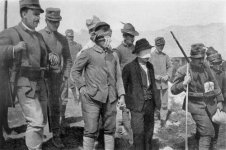The "Italian Republic asks for forgiveness" to more than 1,000 fallen in gray-green (but the exact figure would be greater) killed by our firing squads. Without a reason ...
On a bronze plaque to be affixed in a wing of the Victorian, the Italian Republic will make clear "the will to ask for forgiveness" for the fallen of the Great War forgotten sentenced to death or executed for disciplinary reasons on the ground for acts of rebellion: 750 soldiers shot at the end of a regular process, the 350 soldiers passed through the decimation or executed directly from superiors, the unknown number of soldiers killed during the fighting by "friendly fire" to prevent retreating from the positions assigned to them. All in the name of a military 19th century code that suffered the most ruthless application thanks to the "circular Cadorna": a service order of the Chief of Staff of the Army, as witness the commission entrusted to General Tommasi near the end of the war, allowed the high command and military courts to go beyond the limits imposed by law. Exactly one hundred years later, the House of parliament approved (331 in favor, none against, one abstention) the law for the rehabilitation of the fallen forgotten.

On a bronze plaque to be affixed in a wing of the Victorian, the Italian Republic will make clear "the will to ask for forgiveness" for the fallen of the Great War forgotten sentenced to death or executed for disciplinary reasons on the ground for acts of rebellion: 750 soldiers shot at the end of a regular process, the 350 soldiers passed through the decimation or executed directly from superiors, the unknown number of soldiers killed during the fighting by "friendly fire" to prevent retreating from the positions assigned to them. All in the name of a military 19th century code that suffered the most ruthless application thanks to the "circular Cadorna": a service order of the Chief of Staff of the Army, as witness the commission entrusted to General Tommasi near the end of the war, allowed the high command and military courts to go beyond the limits imposed by law. Exactly one hundred years later, the House of parliament approved (331 in favor, none against, one abstention) the law for the rehabilitation of the fallen forgotten.


